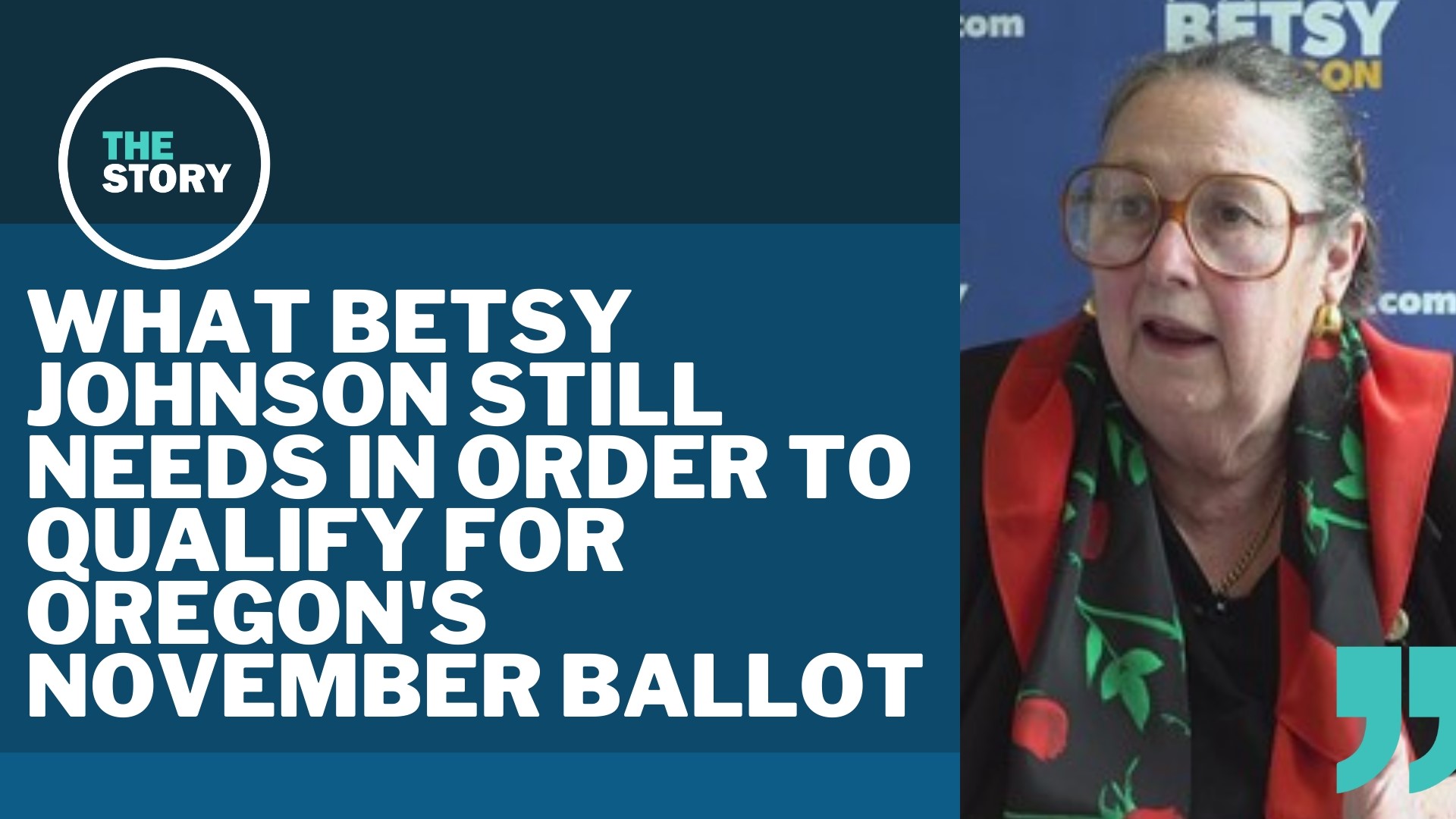PORTLAND, Ore. — Oregon gubernatorial candidate Betsy Johnson has raised more than $3 million this year and has been openly campaigning for months — but because she's running as a non-affiliated candidate, she's not technically on the ballot just yet.
State-recognized parties nominate their candidates, but non-affiliated candidates need signatures and a petition to have their names printed on the general ballot. Candidates can also run as write-ins.
As a non-affiliated candidate, Johnson needs to collect thousands of signatures from registered Oregon voters.
Her unique status at this point in a Governor's race may have an impact on any ramifications from an event over Memorial Day weekend.
TEDxPortland apologized Saturday after adding a surprise talk with Betsy Johnson to its event lineup. The nonprofit called Johnson a "potential political candidate" in its apology, even though she was introduced before the interview as a candidate for Governor.
RELATED: Gun control debate stokes tension during Betsy Johnson's surprise appearance at TEDxPortland
Johnson is considered a gubernatorial candidate by the Oregon Secretary of State’s office, having filed a statement of purpose with her political action committee (PAC). All campaign finance rules currently apply to her as well.
However, Johnson still needs 23,744 signatures from registered Oregon voters to get on the ballot. That qualification process started two weeks ago, when Johnson's campaign filed for a prospective certificate to collect signatures.
A total of 23,744 signatures represents 1% of the votes cast in the most recent presidential election, a requirement dictated by the state.
Johnson’s campaign must turn in signatures and have at least 23,744 signatures verified by Oregon’s elections division within the SOS office by August 30 in order to qualify for the ballot.
“I think 24,000 signatures should not be a barrier. She’s talking as though she’s going to be a candidate, people are considering her as though she’s going to be qualified — she just has to do the actual formality of getting those signatures," said Len Bergstein, KGW political analyst.
Bergstein said he would be shocked if Johnson’s team had trouble collecting the required signatures and he expects Johnson’s campaign will use the results as a political motivator this summer.
“This is a way to show, 'I had to go for 24,000 but I got so many more' — this is going to be another validation point her campaign will use to show that people are just dying to have her in the race," he said.
But the ambiguity in her current status may play a role.
"The fact that she is not fully qualified as a candidate may affect the outcome of the way people look at the TEDx conference flap," Bergstein said.
Federal laws say a nonprofit must give equal opportunity for all political candidates to speak if one is invited to talk at an event.
At TEDxPortland, some crowd members shouted for Johnson to address her record on gun control and felt frustrated by the political nature of the talk.
The Oregon Department of Justice said it received seven complaints referencing Johnson’s appearance at TEDxPortland, which it sent on to the IRS for review.
“I think it’s a legal fig leaf that will probably get everybody through any legal consequences of what happened this past weekend," Bergstein said.
He said Johnson’s path to the ballot — which includes avoiding contentious primary elections — is part of her campaign’s strategy.
“She’s chosen a different path because that’s part of the whole narrative — a part of her appeal or a part that people may be concerned about," he said.
In reference to Johnson's beliefs and voting history on gun control, Johnson released an updated statement Wednesday that expanded on her previous comments.
The statement said, in part, that Johnson would support stronger backgrounds checks and raising the age limit to buy "certain firearms":
"I am a lifelong gun owner and supporter of the Second Amendment. That will never change. What has changed is not where I stand – but where I sit. As governor, my job is to represent the majority of Oregonians – and not just my personal views. I must practice what I preach in moving beyond partisan divides to find common ground for the common good.
"As governor, I will support and enforce stronger background checks for gun purchases and raising the age to purchase certain firearms from eighteen to twenty-one. These are both practical ideas to help keep guns away from people who could be a danger to themselves or others. But new gun laws alone are not enough. Oregon’s mental health system is the worst in the nation – I will lead to change that."
As of this week, Johnson's campaign was sitting on nearly $5.2 million in cash, according to campaign finance records. About $2.8 million was rolled over from last year, and she's spent nearly $3.3 million while raising a fresh $5.6 million within the last five months.
Johnson has received a significant amount, $1.75 million, from Nike co-founder Phil Knight, according to those same records from the Oregon Secretary of State's office.
By contrast, Democratic candidate Tina Kotek and Republican candidate Christine Drazan each have less than $120,000 left after the primaries, and neither campaign has matched Johnson's total raised.

